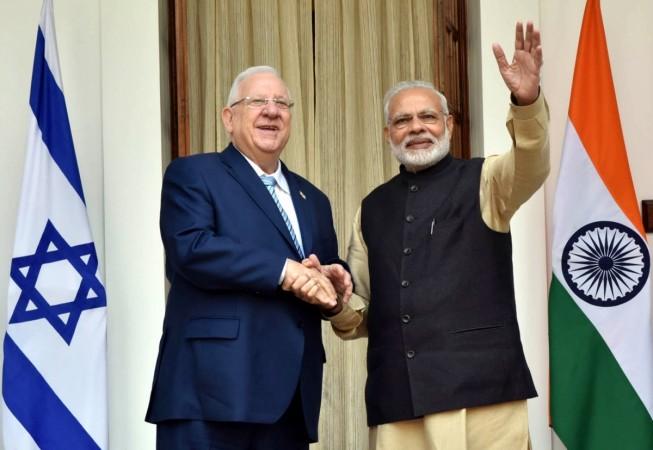
Prime Minister Narendra Modi's diplomacy is set to roll again.
He is set to visit Israel in June or July to celebrate the completion of 25 years of full diplomatic relations between the two countries.
The high-profile visit will not include a trip to Palestine, as has been the custom all through. This dissociation of Israel and Palestine indeed marks a new shift in India's foreign policy.
India's changing stance vis-a-vis Israel has come of age and with it, its own foreign policy priorities as well.
Unlike in the days of non-alignment when India had domestic and foreign policy compulsions to avoid Israel, Modi's era has seen New Delhi more unapologetic about maintaining a rapport with Tel Aviv, a journey flagged off by Congress prime minister PV Narasimha Rao in the early 1990s.
As in other fields like liberalising the economy or bettering ties with the West, improving relations with Israel was also seen a change in course that Rao initiated and Modi decided to build on further.
India has de-hyphenated Israel and Palestine
Keeping realpolitik in mind, India's foreign policy planners have essentially de-hyphenated Israel from Palestine, the two names that invariably made up the whole.
Earlier, we always saw Indian leaders mentioning both names while speaking on one. But of late, that tradition has undergone a change, even though External Affairs Minister Sushma Swaraj said in 2014 that New Delhi's Israel-Palestine policy has essentially remained the same.
In fact, Modi is not the first leader to bypass Palestine while visiting Israel. In November 2014, Union Home Minister Rajnath Singh visited Israel without setting a foot in Palestine. But that did not mean India has completely ignored Palestine.
Last November, India sent Minister of State for External Affairs MJ Akbar to Ramallah and he did not stop in Tel Aviv. This time, too, India will host Palestinian President Mahmoud Abbas before PM Modi makes his visit to Israel.
This essentially brings up to two questions: Is India leaning towards Israel to cater to its own interests? Secondly, by doing so, is India laying the foundation of its involvement in the new geopolitical realities in West Asia?
Security cooperation matters more now than humanitarian causes
The answer to the first question is yes. In the wake of growing terrorism across the world, security cooperation has become key in the discourse of international relations and India has increasingly drawn closer to Israel for supply of military hardware and other trade (Israel is now the third biggest arms supplier to India after Russia and the US).
Amid all the talk of realistic security and anti-terror cooperation, the humanitarian concern for Palestine has taken a backseat.
Getting close to Israel means India will also have to keep in mind other countries' relations
The second answer is more significant for New Delhi. International relations today are undergoing a churning with the distinctions between camps increasingly blurred.
Getting closer to Israel makes a number of other issues relevant — like the relations that countries like the US and Iran share with Israel.
Speaking about US-Israel relations, President Donald Trump hasn't yet revealed any clear policy vis-a-vis Tel Aviv, although he did speak in its favour ahead of the presidential election last year, marking a departure from the days of Barack Obama.
India doesn't have much of a presence in West Asia and it needs to take other things into account before getting too close to Israel.
Also when one speaks of Iran, the same holds true. Israel and Iran are at loggerheads while India has a close relationship with Iran for geopolitical (Chabahar Port) and economic (oil) reasons.
Besides, by getting too close to Israel, India also gives rise to the risk of attracting the Islamic State's ire. Hence, the Modi regime will still have to do a lot of balancing when it comes to Israel, even without Palestine on the scene.
India-Israel relations: A brief look
- India initially recognised Israel, but refrained from setting up full diplomatic relations with the country for a variety of reasons, including religion and the Palestinian question.
- India believed having diplomatic relations with Israel would hurt its relations with Arab countries who were at loggerheads with the Jewish state.
- India set up full diplomatic ties with Israel in early 1992. PV Narasimha Rao was the prime minister then.
- In 2014, the NDA government refused to take sides in the Gaza conflict and asked both sides to work towards peace. However, the government's refusal to adopt a resolution against Israel as was sought by the Opposition, was seen by many as a hint towards India's changing stance vis-a-vis Israel.
- Israel today is the third-largest arms supplier to India after Russia and the US.










